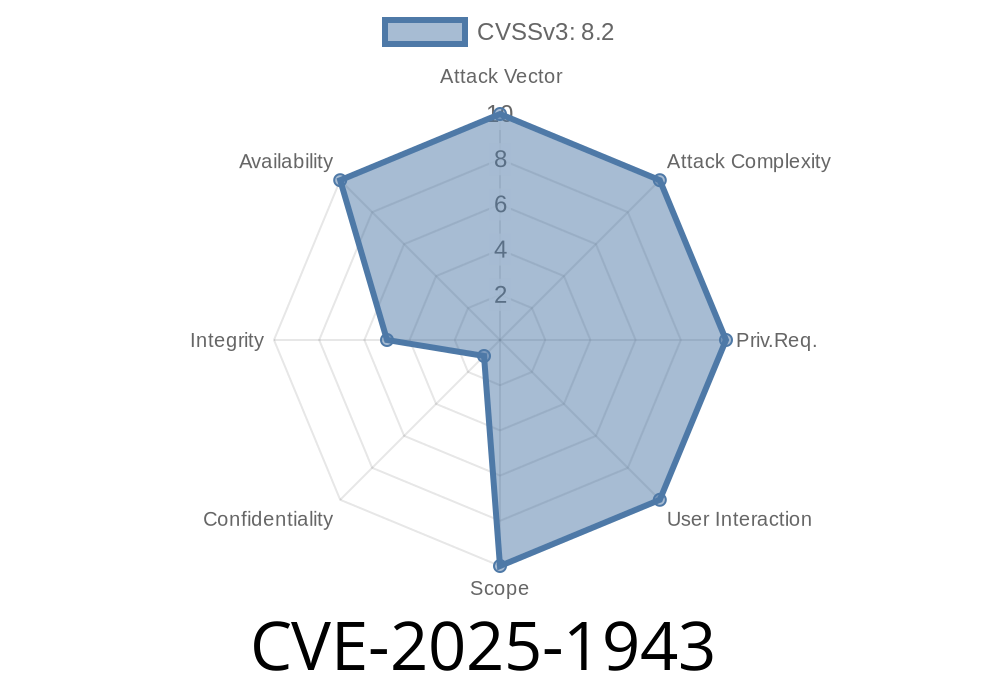Memory safety vulnerabilities are no stranger to complex software, especially web browsers and email clients used by millions. CVE-2025-1943 turns a spotlight on this issue, affecting widely used Mozilla products: Firefox 135 and Thunderbird 135. Here’s everything you need to know, in plain language, about this critical issue, how it works, and what you need to do.
What is CVE-2025-1943?
CVE-2025-1943 is a security vulnerability that exposes users of Firefox (below version 136) and Thunderbird (below version 136) to potential attacks due to memory safety bugs. These types of bugs often arise when a program incorrectly manages memory—reading or writing outside the boundaries it’s supposed to, which can corrupt memory in unpredictable ways.
Mozilla's advisory (see original reference) points out that, while some of these bugs showed “evidence of memory corruption,” none were known to be actively exploited at the time of discovery. But, Mozilla admits that “with enough effort, some of these could have been exploited to run arbitrary code.”
Why Should You Care?
- Attackers could run code: A memory corruption bug, if manipulated correctly, lets hackers run their own code on your computer. Imagine an attacker taking control of your browser just by tricking you into visiting a malicious website!
- Widespread impact: These vulnerabilities affect everyday users who might not even know they’re at risk.
Let’s break it down simply.
Firefox and Thunderbird are written mostly in C++, a fast programming language known for low-level memory access—but also for being unforgiving if a developer makes a mistake.
A common memory safety bug looks like this
char buffer[16];
strcpy(buffer, userInput); // Vulnerable to buffer overflow!
If userInput is larger than 16 characters, it will overwrite other data in memory. When this happens in a complex browser or mail client, the results can be unpredictable, and sometimes attackers can take control.
Real World Example (Simplified)
Suppose there was a bug in the rendering of certain HTML or email content that didn’t check for sizes correctly:
// Hypothetical vulnerable function
void renderContent(const char* content) {
char temp[128];
// Copies content without checking size
strcpy(temp, content); // If 'content' is >128 chars, overflow!
display(temp);
}
An attacker crafts a piece of content (could be a web page or an email) that triggers this bug. By carefully choosing the data, they might overwrite crucial parts of memory—like return addresses or function pointers—leading to arbitrary code execution.
Find the bug: The attacker researches the exact code responsible for the vulnerability.
2. Trigger the bug: The attacker crafts a malicious web page or email message, sending data that overflows or corrupts memory.
3. Gain control: If the attacker is skilled, they can use this corruption to execute their own code—maybe to install a malware or steal your data.
The process is technical, but these are well-known attack methods for software vulnerabilities like this.
Protection: What Should You Do?
Easy answer: *Update now!*
Mozilla has fixed these issues in Firefox 136 and Thunderbird 136. Updates are straightforward, so check for updates if you haven’t done so yet.
For Firefox
- Click the menu button → Help → About Firefox. It will check for updates and install them for you.
References
- Mozilla Security Advisory for Firefox 135
- NVD Entry for CVE-2025-1943 *(once published)*
- Mozilla’s Release Notes
Final Words
Memory safety bugs are an ongoing challenge in C++ applications. CVE-2025-1943 is important because it emphasizes the need for timely security updates. Stay safe out there—make sure your browser and email client are up to date.
If you’re a developer, consider using safer programming patterns or languages with stronger memory safety, such as Rust (which Mozilla themselves are gradually adopting for this very reason).
Have questions or concerns? Check the links above, or reach out to Mozilla’s support channels.
Timeline
Published on: 03/04/2025 14:15:39 UTC
Last modified on: 04/03/2025 13:30:58 UTC
